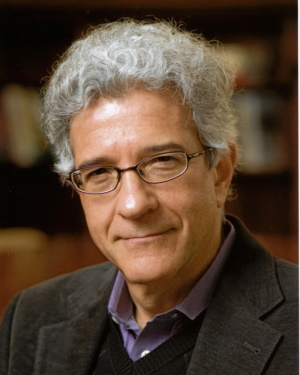Since I will be teaching in the History Department this spring, I thought you would all like to know a little about my personal and professional background.
I was born in a kibbutz (a communal village) in Israel in 1954, and was raised in Tel Aviv, on the shores of the Mediterranean. Tel Aviv shares some characteristics with Taipei, though it is much smaller. It is messy, lively, stays up late and gets up early, and has a rather complicated relationship with the rest of the country as well as the Jewish Diaspora. It was a little provincial town with great aspirations when I was a child, and it is a bigger town with even greater cosmopolitan aspirations now.
I served in the Israeli army in the early 1970s and then acquired a first degree in History at the University of Tel Aviv. After some time in Germany and the United States I completed my D.Phil. at St. Antony's College, Oxford, in the early 1980s and taught for several years at Tel Aviv before moving to the United States, where I have been teaching at Brown University, in Providence, Rhode Island, since 2000. I am married to Wai-yee Li (李惠儀), who is professor of Chinese literature at Harvard, and we have two children who are with us here in Taipei.
My doctoral dissertation and first two books, The Eastern Front, 1941-45 (1985), and Hitler's Army (1991), were engaged with the indoctrination of German soldiers in World War II and the crimes committed by combat units of the Wehrmacht, or German armed forces, especially in the war against the Soviet Union. I then became interested in the links between the reality and image of war since World War I as well as in the implementation and representation of geno-cide, particularly the Holocaust. My next two books, Murder in Our Midst (1996) and Mirrors of Destruction (2000) dealt with these themes. My interest in Holocaust historiography and the years of teaching a course on the Holocaust at Rutgers University, New Jersey, also led me to edit an anthology of essays |

▲白德甫(Omer Bartov)教授 |
on this momentous event in 2000,while an engagement with the relationship between genocide and religion led to the publication of the co-edited book (with Phyllis Mack), In God's Name (2001). Similarly, my preoccupation with war crimes led to the publication of the co-edited book (with Atina Grossmann and Mary Nolan), Crimes of War (2003). That same year I also published the volume Germany's War and the Holocaust, which put together my own essays on the links between war and genocide especially within the context of modern German history. |
I then turned my attention more fully to representation, and in 2005 published The "Jew" in Cinema, which analyzed some 70 European, American, and Israeli films featuring various versions of the stereotype of the "Jew" and its relationship to violence. In the years since then, my interest has increasingly shifted east of Germany. A project I ran for several years at Brown University’s Watson Institute on the borderlands of Eastern Europe has recently culminated in a forthcoming co-edited book (with Eric Weitz), Shatterzone of Empires. My own research in Western Ukraine, a region that was called Galicia in the past, led to the writing of my last book, Erased (2007), on the politics of memory in a region that was for several centuries multiethnic and multi-religious but experienced massive genocide and ethnic cleansing in World War II. I am currently writing a history of one town in that region, starting with the early modern period and progressing all the way to the aftermath of destruction by the Nazi occupation and communal massacres in 1941-1944. The goal is to use this micro- history to understand how interethnic rela-tions evolved through coexistence, interac-tion, and destruction. The town I am writing about, Buczacz (or Buchach), also happened to have been my mother’s childhood home.
我於2011年春應邀至臺大歷史系擔任客座教授,以下是我個人及專業背景的自我介紹。
在1954年,我出生於一個以色列的基布茲(Kibbutz,即奉行社會主義的合作社式社區),並在地中海岸邊的特拉維夫(Tel Aviv)長大。特拉維夫的某些特質和臺北有點像,雖然面積比臺北小得多。那是個凌亂、有生氣、早出晚歸,並且與國家的其他地區和「猶太人的離散」(Jewish Diaspora)有著相當複雜關係的城市。在我小時候,特拉維夫是個滿懷志向的地方小城,而現在,她已經成長為更大、且具有更遠大世界性抱負的城市。
我在1970年代早期服兵役,並於特拉維夫大學取得歷史學士學位。之後我到德國和美國各待了一段時間,於牛津大學聖安東尼學院獲得歷史博士學位。在1980年代早期,我任教於特拉維夫好幾年,之後移居美國。從2000年開始,我任教於羅德島州帕維敦斯的布朗大學。內人李惠儀是哈佛大學東亞系中國文學教授,這次我們與兩個小孩一起到臺北。
以下簡介我所編著的幾本專書。我的博士論文和前兩本著作The Eastern Front, 1941-45: German Troops and the Barbarisation of Warfare (1985) 和Hitler’s Army: Soldiers, Nazis, and War in the Third Reich (1991),都是關注第二次世界大戰期間,德國士兵曾否受納粹黨教條支配的問題,及德軍武裝部隊的罪行,尤其是在對抗蘇聯戰爭的東邊陣線。我那時也開始關注從第一次大戰以來,戰爭的事實與其形象之間關聯("links between the reality and image of war")的問題,以及種族滅絕的執行及其記憶、書寫與再現("implementation and re-presentation of genocide"),特別是二次大戰時納粹對猶太人的大屠殺(Holocaust)。其後兩本著作,Murder in Our Midst: The Holocaust, Industrial Killing, and Representation (1996) 及Mirrors of Destruction: War, Genocide, and Modern Identity (2000) 即處理這些議題。此外,基於我對大屠殺歷史書寫及相關理論(Holocaust historiography)的興趣,以及數年在紐澤西州羅格斯大學教授大屠殺課程的心得,在2000年編著了相關議題的論文合集。同時,因研究大屠殺與宗教之間的關係,我與Phyllis Mack合編In God's Name: Genocide and Religion in the Twentieth Century (2001)。比物連類,旁及我對戰爭罪行之關注,於是與Atina Grossmann和Mary Nolan合編了Crimes of War: Guilt and Denial in the Twentieth Century (2003)。同年,並出版我個人的論文集Germany's War and the Holocaust: Disputed Histories,彙集關於戰爭與大屠殺關聯性之研究論文,特別聚焦二者如何與現代德國歷史的脈絡與走向不可分割。
爾後我的研究興趣更全然地轉向「再現」(representation)的問題。2005年出版The "Jew" in Cinema: From The Golem to Don't Touch My Holocaust,分析70部左右歐洲、美國和以色列的電影中,各種不同類型的猶太人刻板印象及其與暴力的關係。從那幾年開始,我的興趣也逐漸轉向東歐。在布朗大學華森研究中心主持數年的一個關於東歐邊境的計畫,最近終於獲致成果──與Eric Weitz合編的Shatterzone of Empires將於近期出版。我對西烏克蘭的研究──此地過去稱為「加利西亞」(Galicia)──促成了最新著作Erased: Vanishing Traces of Jewish Galicia in Present-Day Ukraine (2007)的完成。此書論及此地區政治與歷史如何界定記憶("politics of memory"),幾個世紀以來多民族和多宗教雜處、融合、紛爭,卻在二次大戰間演成大規模的破壞和種族傾軋與屠戮。我目前正在書寫該區一個城鎮的歷史,從十六世紀直至納粹佔領和集體屠殺破壞之後的1941至1944年間。其目的是見微知著,要通過地方史了解種族關係的分合與共處相傾。這個城鎮名為Buczacz(或稱Buchach),也恰好是我母親童年成長的地方。
|